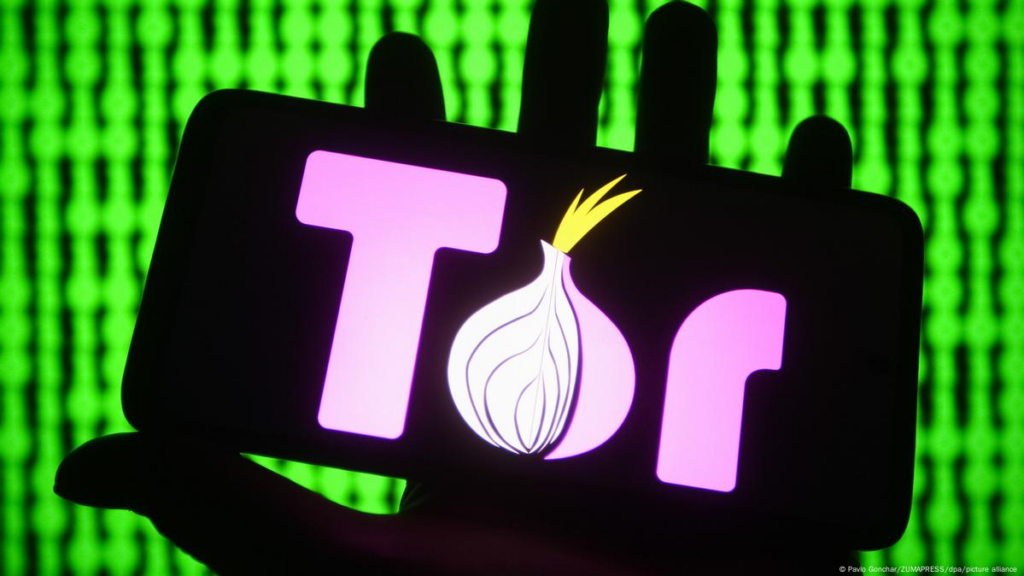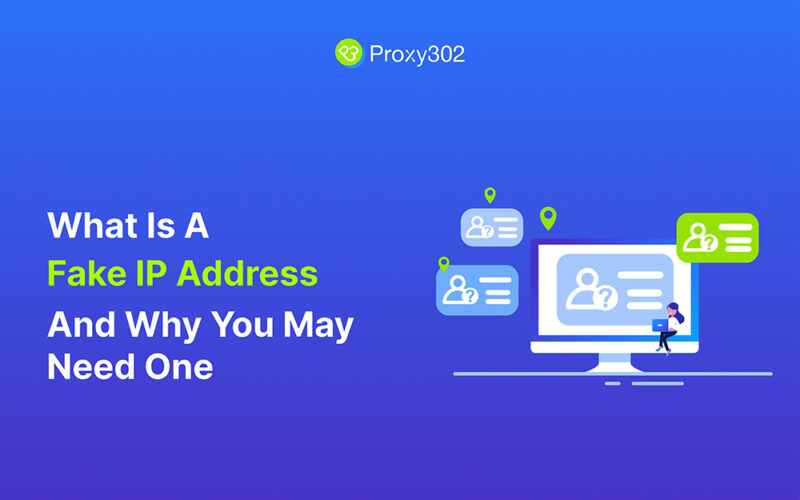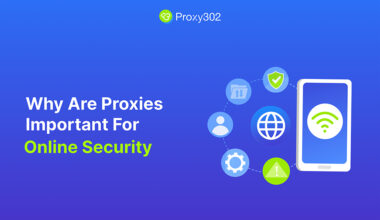In our hyper-connected world, where every click, search, and interaction can be tracked, the quest for privacy feels more urgent than ever. Imagine the internet as a bustling city where everyone knows your name and what you’re up to—comforting for some, but unsettling for many. With cyber threats and data breaches on the rise, it’s no wonder that people are seeking sanctuary in the anonymity of a fake IP address. According to a 2023 report by Cybersecurity Ventures, cybercrime is expected to cost the world $10.5 trillion annually by 2025, underscoring the critical need for robust privacy measures. So, what is a fake IP address, and why might it be your digital cloak of invisibility? Let’s delve into the details.
What Is a Fake IP Address?

An IP address is like a digital fingerprint for your device on the internet. It allows websites and services to identify and communicate with your device. A fake IP address, on the other hand, is a method of masking your real IP address to make it appear as though you’re accessing the internet from a different location.
Real vs. Fake IP Addresses
When you connect to the internet, your Internet Service Provider (ISP) assigns you an IP address. This address can reveal your approximate location and, in some cases, even your identity. A fake IP address, however, is generated through various methods to disguise your real location. This can be achieved using tools like VPNs, proxy servers, or the Tor network.
Common Misconceptions
Many people believe that using a fake IP address is illegal or inherently malicious. However, this isn’t always the case. While some individuals might use fake IP addresses for unethical purposes, many use them to protect their privacy, bypass geo-restrictions, or conduct legitimate business activities.
Why You Might Need a Fake IP Address

Privacy and Anonymity
In an era where data breaches and surveillance are common, maintaining privacy online is crucial. A fake IP address can help shield your online activities from prying eyes, whether they belong to hackers, advertisers, or even government agencies. By masking your real IP, you can browse the web without leaving a digital trail.
Bypassing Geo-Restrictions
Ever tried to watch a video or access a website only to be told it’s not available in your region? This is due to geo-restrictions that limit access based on your location. By using a fake IP address, you can bypass these restrictions and access content as if you were in a different country.
Avoiding IP Bans
Sometimes, websites or services might ban your IP address for various reasons. This could be due to a misunderstanding, a security measure, or even a mistake. Using a fake IP address can help you regain access without waiting for the ban to be lifted.
Testing and Development
Developers and testers often need to simulate different user environments to ensure their applications work globally. A fake IP address allows them to test their software from various locations without physically being there.
How to Generate a Fake IP Address
There are several methods to generate a fake IP address, each with its own advantages and considerations.
1. Using a VPN (Virtual Private Network)
A VPN is one of the most popular tools for generating a fake IP address. It encrypts your internet traffic and routes it through a server in a location of your choice, masking your real IP address.
- How VPNs Work: When you connect to a VPN, your internet traffic is routed through a server operated by the VPN provider. This server assigns you a new IP address, making it appear as though you’re accessing the internet from the server’s location.
- Popular VPN Services: Some well-known VPN providers include NordVPN, ExpressVPN, and CyberGhost. These services offer a range of features, including high-speed connections, strong encryption, and servers in multiple countries.
2. Using Proxy Servers
Proxy servers like Proxy302 act as intermediaries between your device and the internet. By connecting to a proxy server, you can mask your real IP address with the server’s IP.
- Types of Proxies: There are various types of proxies, such as residential proxies, data center proxies, and SOCKS proxies. Residential proxies, like those offered by Proxy302, use IP addresses assigned by ISPs, making them appear more legitimate.
- City-Level Targeting: Proxy302 offers comprehensive proxy types, including city-level targeting, allowing you to choose specific locations for your fake IP address.

Related Reading: VPN or Proxy: What’s Best for Your Needs in 2025?
3. Using Tor Browser

The Tor network is designed for anonymity and privacy. It routes your internet traffic through multiple volunteer-operated servers, making it difficult to trace your activity back to your real IP address.
- How Tor Works: Tor encrypts your data multiple times and sends it through a series of nodes before reaching its destination. Each node peels away a layer of encryption, ensuring that your original IP address remains hidden.
- Considerations: While Tor is highly effective for anonymity, it can be slower than other methods due to the multiple layers of encryption and routing.
4. Using Random IP Generator

For those who need to generate IP addresses for testing purposes or specific applications, a Random IP Generator can be a useful tool. These generators create random IP addresses that can be used to simulate different network configurations or to test software. However, it’s important to note that these generated IPs are not functional for browsing the internet but are useful for testing network-related applications.
How It Works: A Random IP Generator typically uses algorithms to produce a sequence of numbers that resemble an IP address format, such as IPv4 (e.g., 192.168.1.1) or IPv6. These numbers are randomly selected to form a complete IP address.
Applications: Developers often use random IP addresses to test software applications, configure network simulations, or conduct security assessments. It’s a practical tool for ensuring applications can handle a variety of network scenarios.
5. IP Spoofing Techniques
IP spoofing involves altering the source IP address in the header of a packet to make it appear as though it’s coming from a different location. This method is more technical and often used in network testing and security research.
- Legal and Ethical Considerations: It’s important to note that IP spoofing can be used for malicious purposes, such as cyberattacks. Always ensure that your use of IP spoofing is legal and ethical.
Legal and Ethical Considerations
Before using a fake IP address, it’s crucial to understand the legal and ethical implications. The legality of using fake IP addresses varies by jurisdiction, and misuse can lead to serious consequences.
- Legal Use: Using a fake IP address for privacy, security, or legitimate business purposes is generally legal. However, using it to commit fraud, access restricted content illegally, or conduct cyberattacks is not.
- Ethical Use: Always consider the ethical implications of your actions. Respect the terms of service of websites and services, and avoid using fake IP addresses to harm others or gain unfair advantages.
Related Reading: Proxy Server Legality: What You Need to Know Before Using One
FAQs About IP Addresses and Fake IP Addresses
1. What is an IP address?
An IP (Internet Protocol) address is a unique string of numbers separated by periods (IPv4) or colons (IPv6) that identifies each computer using the Internet Protocol to communicate over a network. It serves two main functions: identifying the host or network interface and providing the location of the host in the network.
2. Why would someone want to use a fake IP address?
People use fake IP addresses to protect their privacy, bypass geo-restrictions, test network applications, and enhance security. By masking their real IP address, users can prevent tracking, access content unavailable in their region, and conduct various online activities anonymously.
3. How does a VPN help in generating a fake IP address?
A VPN (Virtual Private Network) routes your internet traffic through a server located in a different region or country, effectively replacing your original IP address with the server’s IP address. This not only hides your real IP but also encrypts your data, providing an additional layer of security.
4. Are there any legal concerns with using a fake IP address?
Using a fake IP address is legal in many jurisdictions, especially when done for privacy protection or accessing geo-restricted content. However, using it for illegal activities, such as fraud or hacking, is against the law. Always ensure your actions comply with local laws and regulations.
5. Can a fake IP address be traced back to me?
While using a VPN, proxy, or Tor can make it difficult to trace your real IP address, it’s not entirely foolproof. In certain situations, such as legal investigations, authorities may be able to trace activities back to you, especially if the VPN or proxy service keeps logs of user activity.
6. What is the difference between a proxy and a VPN?
Both proxies and VPNs can mask your IP address, but they work differently. A proxy acts as a gateway between you and the internet, handling requests on your behalf. A VPN, on the other hand, encrypts all of your internet traffic and routes it through a secure server, providing more comprehensive privacy and security.
7. What are the limitations of using a Random IP Generator?
A Random IP Generator is primarily used for testing and simulation purposes. The IP addresses it generates are not functional for actual internet browsing or communication. They are useful for configuring network simulations, testing software applications, or conducting security assessments.
8. How can I check my current IP address?
You can easily check your current IP address by using online services like “What is my IP” websites, which display your public IP address. Alternatively, you can find it in your network settings on your device.
Conclusion
In conclusion, a fake IP address can be a powerful tool for enhancing your online privacy, accessing restricted content, and conducting legitimate activities securely. By understanding the different methods of generating a fake IP address and the legal and ethical considerations involved, you can make informed decisions about your online security.
Ready to experience the benefits of a fake IP address? Proxy302 offers a flexible, pay-as-you-go model with no tiered pricing, making it easy to get started without a monthly subscription. With over 65 million IPs globally and comprehensive proxy types, including city-level targeting residential proxies, Proxy302 is your go-to solution for online privacy and security. Sign up today for a free trial and take control of your digital footprint!









8 comments
Very useful phrase
It not absolutely that is necessary for me.
On mine it is very interesting theme. I suggest you it to discuss here or in PM.
Can you be more specific about the content of your article? After reading it, I still have some doubts. Hope you can help me.
Willingly I accept. In my opinion, it is an interesting question, I will take part in discussion. Together we can come to a right answer.
I don’t think the title of your article matches the content lol. Just kidding, mainly because I had some doubts after reading the article.
Really appreciate how this post breaks down the idea of a fake IP address—especially the comparison to a digital fingerprint. It’s a helpful reminder that privacy online isn’t just about avoiding ads; it’s about protecting our identity in a world where tracking is the norm. Curious to see how this trend evolves as cybercrime continues to rise.
What other topics would you like to see covered on the blog? Let us know in the comments!